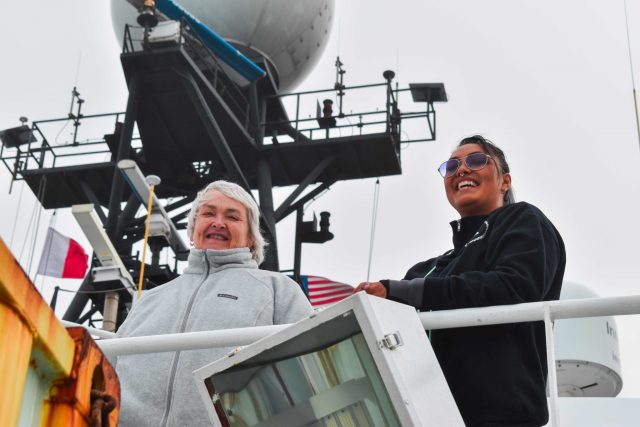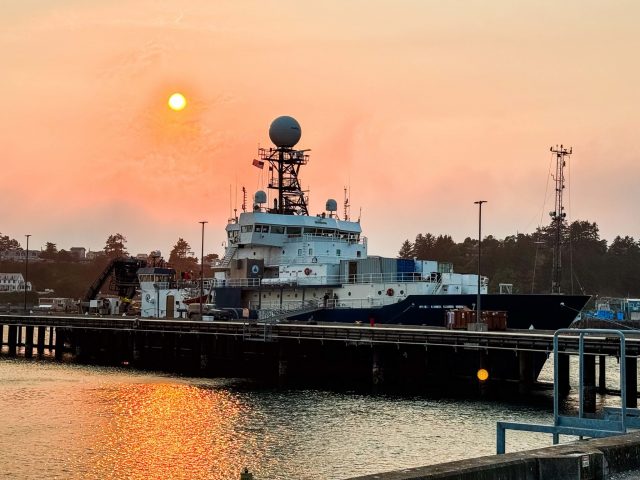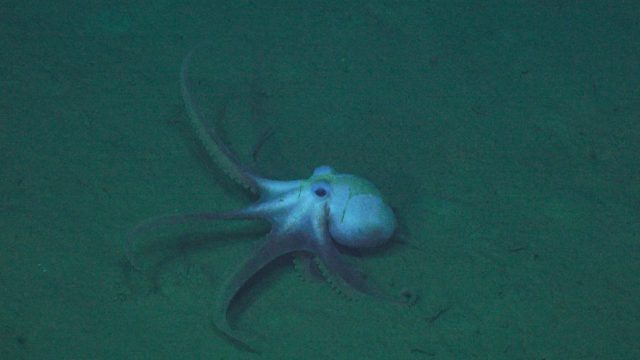Life at Sea: Student Reflections from the VISIONS’24 (Leg 1) Expedition
As part of the Regional Cabled Array operations and maintenance 2024 cruise, a cohort of 24 undergraduates spanning different countries of origin, states, and socio-economic backgrounds, participated in the expedition as part of the UW at-sea experiential learning program called VISIONS. This program has allowed over 200 undergraduate students, studying myriad disciplines, the opportunity to spend 8-45 days at sea on NSF-funded global class research ships utilizing state-of-the art remotely operated vehicles (ROV). Onboard, they stand 4-hr on, 8-hr off watches in the ROV control room working alongside the pilots, and RCA engineers and scientists. They see first-hand life forms rarely seen thriving in some of the most biologically productive waters in the ocean along the Cascadia Margin, the abyss at 2900 m water depth, and on 350°C underwater hot springs at the summit of Axial Seamount – the most active underwater volcano off the Oregon coast. The interviews below provide a glimpse of VISIONS’24 student impressions of life at sea and their experiences onboard. For many, their lives are forever changed.
Among the cohort was Nichole Sams, a PhD student in the Human-Centered Design and Engineering department, who brought a unique perspective to the program. Working alongside scientists and engineers, she embraced the opportunity to merge her expertise in mental health research with hands-on ocean exploration. Below, Nichole shares how her time aboard the R/V Atlantis shaped her academic journey, expanded her skill set, and inspired new approaches to collaborative research.
What motivated you to join the VISIONS program?
I am a Phd Student in the Human-Centered Design and Engineering department and I study designing and measuring mental health in the wild. When I first heard about VISIONS, I was so excited as I had always had a love for marine biology, but never got a chance to explore. My role and perspective on Visions was a little different, given my field being so far from everyone else on the boat.
What skills did you develop or strengthen during your time at sea that you feel will be valuable in your future career?
I went on Visions to practice research through design techniques, and I built a very beautiful research project around my time on Visions, and I am currently submitting to a large conference, Designing Interactive Systems. Visions gave me an exciting and wonderous play ground to explore my science and start to connect my PhD dissertation pieces together.
How do you see the skills and experiences gained from this program contributing to your role in the future workforce, particularly in science and engineering fields?
I’d like to think that my project aboard VISIONS will serve as a blueprint in how I operate with science teams. I designed a specific method to use on the boat that was very successful, and I plan to use similar methods when working with research teams to design mental health and wellness for their specific contexts.
What advice would you give to other students considering applying for experiential learning programs like VISIONS?
The combination of excitement and nerves can be a lot more impactful than people think when they aren’t going home to their own beds every night. Do preparation to keep yourself mentally strong while adventuring.
What was the most surprising thing you experienced during your time at sea?
Deb and Katie kept telling me that you just have to be on the boat to understand what the boat is like, and that’s so true, it’s an experience unlike any other, and I will carry it with me forever. I think the three things that were most surprising for me were:
- On the bow of the Atlantis, looking up at the galaxies, I found peace with in myself. As neurodivergent person, my mind is never really a quiet place. But on the bow of the Atlantis, I learned how to sit quiet in my mind and find joy in that calmness. I have now learned that this is called the “Blue Mind” which is that humans often receive meditative benefits from enjoying the sea.
- The Beyond-Human Connection. My first dive down I was hooked and mesmerized by the “Big Charismatic Megafauna” as Co-Chief Katie likes to say. I took a photo of a muso octopus and that will stick with me for the rest of my life.
- My science worked! I was engaging in a new, less physically based science methodology, speculative design, and it really worked!

Deb and Nichole during departure. (c): M. Elend, University of Washington; V24

The R/V Atlantis docked in Newport, Oregon at Sunset (c): Nichole Sams, University of Washington; V24

